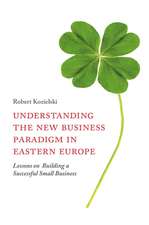Social Enterprise and the Third Sector: Changing European Landscapes in a Comparative Perspective
Editat de Jacques Defourny, Lars Hulgård, Victor Pestoffen Limba Engleză Paperback – 10 iun 2014
| Toate formatele și edițiile | Preț | Express |
|---|---|---|
| Paperback (1) | 491.21 lei 6-8 săpt. | |
| Taylor & Francis – 10 iun 2014 | 491.21 lei 6-8 săpt. | |
| Hardback (1) | 1003.93 lei 6-8 săpt. | |
| Taylor & Francis – 9 iun 2014 | 1003.93 lei 6-8 săpt. |
Preț: 491.21 lei
Nou
94.01€ • 97.78$ • 77.61£
Carte tipărită la comandă
Livrare economică 14-28 aprilie
Specificații
ISBN-10: 0415831563
Pagini: 296
Ilustrații: 9 black & white illustrations, 12 black & white tables, 9 black & white line drawings
Dimensiuni: 156 x 234 x 23 mm
Greutate: 0.5 kg
Ediția:New.
Editura: Taylor & Francis
Colecția Routledge
Locul publicării:Oxford, United Kingdom
Public țintă
General, Postgraduate, and UndergraduateCuprins
FOREWORD. INTRODUCTION: Introduction to the SE field. Section 1 - The Dynamics of Social Enterprise And Social Entrepreneurship 1. Emerging models of social enterprise: Comparison between Europe, the US and Eastern Asia. 2. Social enterprise and the third sector ߝ Innovative service delivery or a non-capitalist economy? 3. The social and solidarity economy a theoretical and plural framework. 4. Solidarity-based Initiatives: Field realities and analysis. 5. Solidarity economy in Latin America. 6. Social enterprise in East Asia. Section 2 - Governance and Policy Issues 7. Governance and social enterprises. 8. Market, hierarchy and cooperation: transaction cost and the theory of associative firm. 9. Theoretical introduction to multi-stakeholder enterprise. 10. Hybridity, Innovation and the Third Sector: the co-production of public services. 11. Social innovation and social enterprise: convergences and divergences. 12. Third sector organizations and welfare services: How helpful are the debates on welfare regimes and a European social model?
Recenzii
‘Social enterprise has become a key dimension of development within the European third sector in the 21st century. It is both a noun, describing new forms of organization within the sector, and a verb, describing new forms of activity within organizations. The editors have assembled contributors comprising the leading scholars in this new field from across the EU. Drawing on the research co-ordinated by the EMES Network, their contributions explore some of the key theoretical and empirical challenges for third sector development posed by the impact of social enterprise.’ - Pete Alcock, Professor of Social Policy and Administration, Third Sector Research Centre, University of Birmingham, UK
‘This timely book locates the EMES approach to social enterprise within the global context, with a particular focus on the governance of social enterprise and the third sector as a means of governance. The book outlines complex concepts clearly and will be of use to a wide range of audiences. Its main contribution is that critics can no longer argue that the social enterprise field is dominated by a lack of rigorous definitions and of conceptual clarity’ - Simon Teasdale, Senior Lecturer, Yunus Centre for Social Business and Health, Glasgow Caledonian University, UK
‘This book places social enterprise, too often presented as an isolated, almost miraculous phenomenon, firmly within its political, economic and social context. Full of fresh insight and disruptive thinking, it will be of interest to academics and students alike.’ - Andy Brady, Course Leader, BA in Charity and Social Enterprise Management, Anglia Ruskin University, UK
Notă biografică
Descriere
The concepts of social enterprise and social entrepreneurship is attracting rapidly increasing attention from academic spheres, policy makers as well as field workers who are setting up new initiatives or reshaping their organizations. These concepts are perceived as defining innovative and dynamic responses to major global challenges in today societies. Although the debate is now developing at the world level, the research and field-level landscapes still differ very significantly among regions and diversity also exists within specific regions such as Europe. This book presents the more comprehensive set of contributions reflecting the European side of this wide debate, with frequent connections to evolutions in other parts of the world. It examines the conceptualization of social enterprise that resulted from the EMES's very first collaborative work. Social Enterprise and the Third Sector will appeal to all third sector researchers, and social economy and social enterprise MBA and postgraduate students as well as intellectual social enterprise leaders and practitioners.























